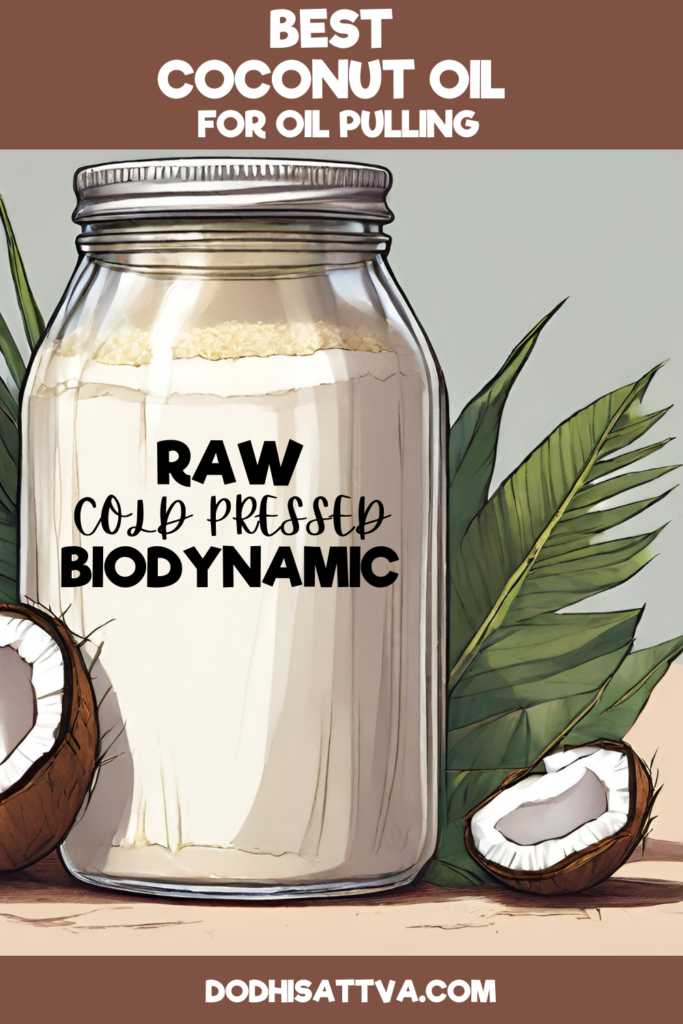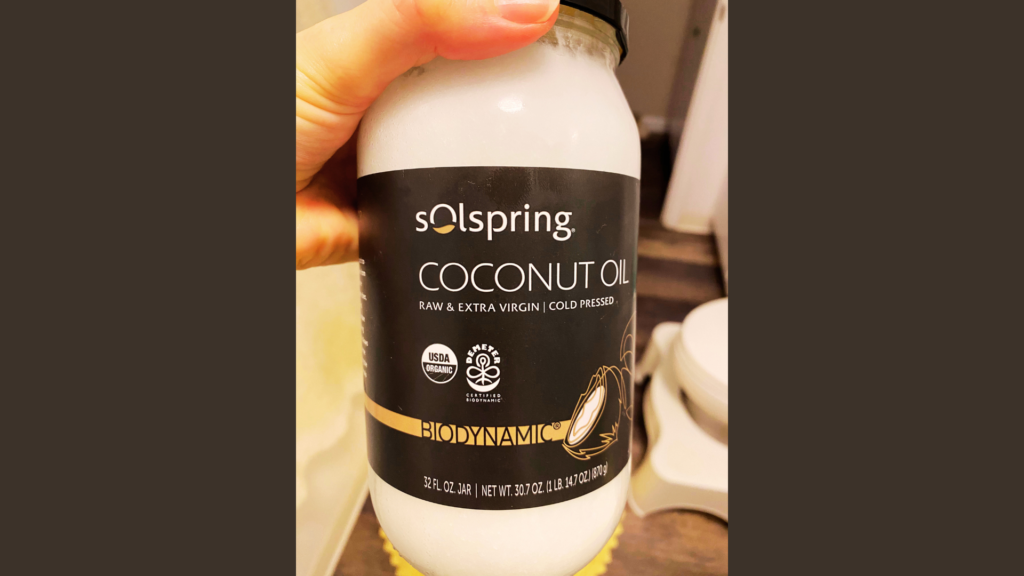#1 Best Coconut Oil For Oil Pulling & Potent Results

The best coconut oil for oil pulling involves looking at several key factors to ensure you are getting the health and medicinal benefits of this ancient practice.
We will cover all the components that make up a truly medicinal coconut oil so that if you are oil-pulling to heal something like a cavity, infection, or a toothache you will get fast and powerful results.
Your mouth is the gateway into your body’s digestive, immune, and endocrine systems.
The microbes that live in our mouths make or break the foundational bacteria that enter these systems.
In the realm of natural oral care practices, coconut oil pulling stands out as an ancient natural remedy, revered for its holistic approach to top oral hygiene.
Rooted in centuries-old Ayurvedic medicine, this technique involves swishing a tablespoon of coconut oil in the mouth for several minutes to combat different teeth issues.
Coconut oil pulling has garnered modern attention due to its potential to promote oral health naturally.
From reducing harmful bacteria in the mouth and enhancing gum health to offering a natural alternative for teeth whitening, coconut oil pulling is celebrated for its simplicity and effectiveness.
In this exploration, we delve into the intricacies of coconut oil pulling, unraveling its benefits, addressing common questions, and uncovering some medical studies behind this time-honored tradition.
What is Oil Pulling?
Coconut oil pulling, an ancient oral hygiene practice, has been used for centuries in traditional Indian medicine known as Ayurveda.
Ayurvedic texts, which date back over 3,000 years, mention oil pulling as a natural way to improve oral health and promote overall well-being.
While coconut oil pulling specifically may not have been mentioned in ancient texts (as different oils were used based on availability and regional preferences), the concept of oil pulling as a practice for oral hygiene has a long history.
Coconut oil, with its antibacterial properties, became a popular choice for oil pulling as its benefits became more widely recognized.
In recent years, coconut oil pulling has gained popularity in the Western world as a natural alternative for maintaining oral health.
How To Oil Pull?
The practice involves swishing a tablespoon of coconut oil in the mouth for about 15-20 minutes and then spitting it out.
The DIY recipe later in this post adds a few helpful ingredients to accelerate the results.
It helps to remove toxins and bacteria from the mouth, promote healthy gums, and whiten teeth, although scientific evidence on some of these claims is limited.

Coconut Oil Pulling Benefits
Most people seeking the best coconut oil for oil pulling are doing so because they are looking for the following Coconut Oil Pulling Benefits:
The Best Oral Health: Oil pulling is believed to help remove harmful bacteria from the mouth, potentially reducing bad breath, preventing cavities, and promoting overall oral hygiene.
Lessen Teeth Sensitivity: Teeth are living, breathing bones. If you have teeth sensitivity it may be related to your lymphatic system being congested.
Since our teeth are living, breathing bones they are indeed connected to the state of blood, the lymphatic system, and our entire body.
The teeth are the gems in the mouth connected to every organ.
We must also look at bone mineralization or the lack thereof and the health of the nerves in the teeth.
Gum Health: Oil pulling may improve gum health by reducing inflammation and preventing gum diseases like gingivitis.
Whitening Teeth: Some people use oil pulling as a natural way to whiten teeth. The swishing action may remove stains from the teeth.
Detoxification: Oil pulling may help detoxify the body by pulling out toxins from the oral cavity. This is because each tooth corresponds to an organ in the body and has nerve endings.
Improved Skin Health: Some individuals use oil pulling to improve skin conditions since our bodies are effected by the microbes that live in our mouths.
Overall Well-being: In traditional medicine systems like Ayurveda, oral health is linked to overall health and well-being. Practitioners of oil pulling often cite holistic health benefits as a reason for the practice.
Natural Alternative: Many people choose oil pulling as a natural alternative to commercial mouthwashes and oral care products that might contain artificial chemicals and additives.
Rated 5 out of 5
Medical Research on Coconut Oil Pulling
You can see here in this study how coconut oil pulling lowered the bad bacteria known as Streptococcus mutans after just 2 weeks of 10 minutes per day of use.
Another study shows the ability of coconut oil pulling to lessen plaque buildup. You can view that study here.
Here is another study in regards to how it helped in cases of gingivitis. After day 7 the gingivitis plaque continued to reduce.
Best Coconut Oil For Oil Pulling Factors
When you are looking for the best coconut oil for oil pulling here are several determining factors to consider.
Lauric Acid Content in The Best Coconut Oil For Oil Pulling
First of all, you want to be looking for raw, cold-pressed coconut oil to ensure a high lauric acid content.
Heating or over-processing the coconut oil will degrade these types of constituents.
This is important because lauric acid is the main substance in coconut oil that provides an antibacterial effect.
Lauric acid is proven to have anti-microbial and anti-inflammatory properties as you can see in this medical study here.
Seeking out the best coconut oil for oil pulling involves one that does not over-process or heat treat.
Coconut Oil Packaging
Looking for a source that uses glass for packaging and storage is key to avoiding toxic chemicals from plastic.
This is important so that chemicals are not leeching into the coconut oil.
Endocrine disruptors like BPA are in cheap plastic containers.
They can mess with your hormones and contribute to health problems, reproductive problems, and certain cancers.
Microplastics: Over time, plastic items can break down into smaller particles known as microplastics.
These tiny plastic particles have been found in water sources, soil, and even the air.
The long-term effects of exposure to microplastics on human health are still being studied, but they pose potential risks.
Cold Pressed Versus Other Processes
If you want the best oil for coconut oil pulling stay away from brands the expeller press, refine, bleach, or deodorize.
All of these processes are subpar when it comes to the best coconut oil for oil pulling because most likely they are using chemicals to do this.
What’s more, is that refined oils may cause:
Loss of Nutrients: The refining process often involves high heat, which can destroy some of the beneficial nutrients and antioxidants present in coconut oil.
Refined coconut oil may have fewer health-promoting properties compared to unrefined coconut oil.
Chemical Residues: Some chemical solvents might be used in the extraction process of refined coconut oil.
Processing Methods: The refining process can involve hydrogenation, which creates trans fats. High intake of trans fats has been associated with various health problems, including an increased risk of heart disease. However, not all refined coconut oils undergo hydrogenation, and it’s essential to check the product label to confirm the absence of trans fats.
Potential Allergens: Refined coconut oil might be processed in facilities that also handle common allergens, such as nuts and soy. Cross-contamination can be a concern for individuals with severe allergies.

What Type of Coconut Is Being Used?
You will find that many commercial brands use copra coconuts which means they are using dried coconut meat.
Copra meat is cheap which helps the company make more of a profit but where does that leave you the consumer?
The issue here is many of these cheaply sourced copra coconut oils can go rancid fast and may not even be clean resulting in sanitary issues.
The Best Coconut Oil for Oil Pulling will use Fresh Raw Organic Coconuts that are used within a small window of time say around 48 hours to ensure freshness and the medicinal properties of coconut oil.
The other component is that the coconuts are USDA Certified Organic.
You don’t want questionable pesticides, herbicides, fungicides, or glyphosate contaminating your coconut oil when used for oil pulling.
And you certainly want to stay away from a genetically modified coconut oil that could cause harm to your body.
Stay Away from Coconut Oil using Chemical Solvents
Chemical solvents used in cheap coconut oil brands pose a human health risk.
Chemical solvents are known to cause damage to the:
- Nervous System
- Lungs
- Reproductive System
- The Brain
What’s more they pose an environmental risk.
Look for cold-pressed coconut oil so that you avoid these chemical solvents and high-heat methods that will take away from the health benefits of the coconut oil.
Particularly the lauric acid and medium-chain triglycerides.
The best coconut oil for oil pulling retains all of its original health benefits just as nature intended it to be.
It will come from a raw untreated or unheated source cold pressed to retain all the beneficial nutrients and medicinal qualities.

Taking it Beyond Organic with Biodynamic Coconut Oil
If you want to take it a step further look for a Biodynamic sourced Coconut oil.
Key principles and practices of biodynamic agriculture include:
-
Biodiversity: Biodynamic farms often have a diverse range of crops and animals. Biodiversity is encouraged to enhance natural ecological processes and minimize the risk of pests and diseases.
-
Organic Farming: Biodynamic farming strictly prohibits the use of synthetic pesticides, herbicides, and genetically modified organisms (GMOs). Instead, natural methods are used for pest and disease management.
-
Composting and Soil Health: Biodynamic farms focus on building and maintaining healthy, nutrient-rich soil through composting, crop rotation, cover cropping, and other sustainable soil management techniques.
-
Astrological Planting Calendar: Biodynamic farmers often follow a planting calendar based on lunar and planetary cycles. They believe that certain celestial events influence plant growth and development.
-
Biodynamic Preparations: Biodynamic farmers use specific herbal and mineral preparations, which are applied to the soil, compost, or directly to plants to enhance soil fertility and promote overall farm vitality.
-
Livestock Integration: Biodynamic farms often integrate livestock into the farming system. Animals provide manure for composting, and their presence contributes to the overall farm ecosystem.
-
Sustainable Farming Practices: Biodynamic agriculture emphasizes water conservation, energy efficiency, and other sustainable practices to minimize the environmental impact of farming activities.
Biodynamic farming is recognized as one of the earliest forms of organic agriculture and is practiced worldwide by farmers and gardeners who are committed to ecological sustainability and a spiritual connection to the land.
Best Coconut Oil for Oil Pulling Q/A
Best Coconut Oil Pulling Recipe
Coconut Oil Pulling Recipe
Take your oral health to the next level with this Biodynamic Essential Oil Infused Coconut Oil Pulling Recipe.With this upgraded coconut oil pulling recipe you will get the power of plant essential oils coupled with healthy probiotics to enhance your oil pulling efforts.
Cuisine: detox
Keyword: diy oil pulling, oil pulling recipe
Equipment
Materials
- 1/2 cup Organic Biodynamic ExtraVirgin Coconut Oil
- 30 drops Oral Essential Oil Blend
- 6 capsules Probiotic Powder
- 1 tbsp Baking Soda Optional but removes surface stains and alkalizes the mouth, promotes gum health and reduces plaque.
Instructions
- If you need to melt down the coconut oil do so in a dehydrator or very lightly on the stove top.
- In a mixing bowl add the oil, essential oil drops and baking soda. Open each probiotic capsule and stir in with a wooden spoon.
- Pour into your silicon molds and freeze for several hours.
- To oil pull simply pop out a cube and swish for 20 minutes.
- Spit out in trash to avoid clogging drain.
Conclusion & Recap
In the pursuit of optimal oral health, choosing the right coconut oil for oil pulling is paramount to avoid toxins and get good results.
In this post we have shared the best coconut oil for oil pulling and what the determining factors are.
Using Natural Remedies such as this is key to address your body’s best health.
Keeping your oral environment naturally healthy is one of the best ways to set your organ and gland systems up for deep health.
Your immune system, endocrine system, and digestive system all benefit when you choose the very best natural remedies.
Purity and Source: The finest coconut oils for oil pulling are sourced from organic, fresh coconuts.
These oils are extracted using methods that retain the coconut’s nutrients including lauric acid which is naturally antibacterial.
Without introducing harmful chemicals additives or toxic solvents you can be sure you are using the very best coconut oil for pulling.
Look for cold-pressed, extra-virgin coconut oil, ensuring the purity of the product you’re using for your oral care routine.
Take it a step further and choose one that is stored in glass and is biodynamic.
Antimicrobial Power: The best coconut oil for oil pulling boasts potent antimicrobial properties, primarily due to its high lauric acid content.
Lauric acid is a natural bacteria-fighting agent that aids in the removal of harmful microorganisms from the oral cavity.
This is found in the highest concentrations when the oils are not heat-treated or over-processed.
Ethical and Sustainable Sourcing:
Beyond oral health, consider coconut oils sourced from companies committed to ethical and sustainable practices.
Supporting brands that prioritize fair trade, eco-friendly cultivation, and community well-being ensures your choice extends positive impacts beyond your health.
In the world of oil pulling, the best coconut oil is more than just a product; it’s a holistic approach to oral wellness and sustainability.
By choosing a coconut oil that embodies purity, effectiveness, freshness, and ethical values, you represent the healthy relationship between your oral health and the health of the planet.
What is the reason you are interested in the best coconut oil for oil pulling?
Have you noticed great results from this practice? Being consistent is key. Give yourself at least 2 weeks to see results.
Let me know in the comments how you have benefited from the practice of coconut oil pulling.
If you enjoyed this post you may enjoy The Hygiene Handbook Ebook in the Shop!
POPULAR POSTS









